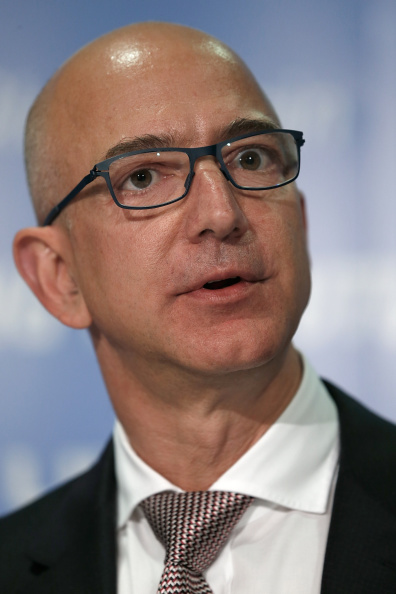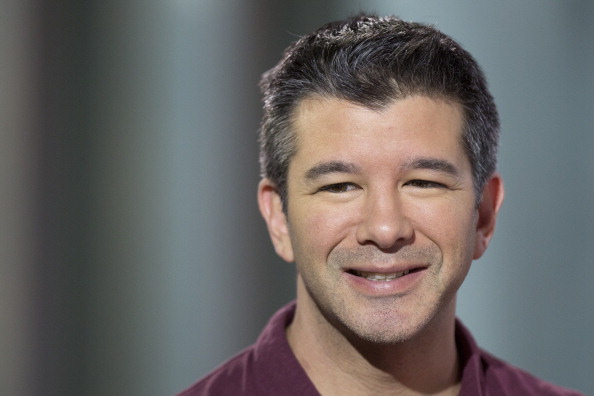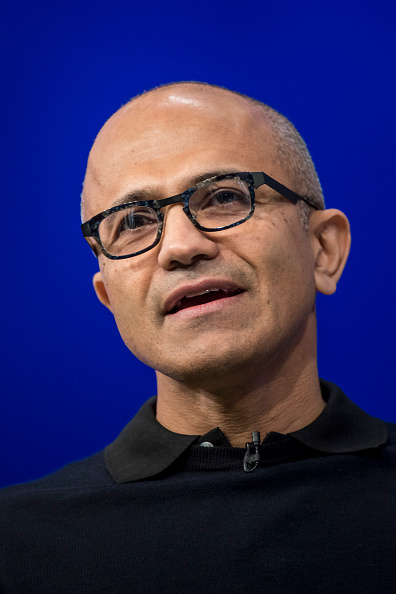When it comes to power in the tech industry, who rules the roost?
Tesla’s Elon Musk, Uber’s Travis Kalanick and Amazon’s Jeff Bezos all make the cut, placing in Juniper Research’s ranking of the top 10 most influential tech executives, as did Jony Ive. Apple’s chief design officer and the mastermind behind the Apple Watch nabbed the second position, placing behind a single man: Satya Nadella, CEO of Microsoft.
Coverage of influence and innovation in the tech industry tends to overlook Microsoft in favor of flashy developments from tech heavyweights such as Apple and Google or disruptive models exemplified by newcomers like as Uber and Snapchat. But when looking at the company’s CEO, market research firm Juniper Research saw a figure of outsized influence, noting that Nadella’s implementation of ‘Windows-as-a-Service’ represented a fundamental change to Microsoft’s OS-focused business model.
Besides Ive, who else gave Nadella a run for his money? Here are Juniper Research’s top 10 most influential tech executives currently shaping the industry, based on criteria including vision, innovation and personal capital.
10. Lei Jun

Position: Xiaomi co-founder and CEO
Why he’s No. 10: As the co-founder of the third largest smartphone distributer, Lei rose to prominence by designing high-quality smartphones while keeping margins low. In recent years, he has overseen the company as it has developed a range of new products, including a wearable device, a tablet and a smart TV.
9. Elon Musk

Position: Tesla co-founder, chairman and CEO
Why he’s No. 9: Tesla has expanded its focus beyond electric cars, announcing the Powerpack and Powerwall batteries, which offer some of the first practical solutions for home owners looking to store surplus energy generated by solar panels. While still too pricey for the majority, Musk is working hard to change that. “The discussion around these products has been underscored by Musk’s vision of bringing affordable electricity products to consumers, with affordability a cornerstone of the products’ appeal,” the report notes.
8. Jeff Bezos

Position: Amazon founder and CEO
Why he’s No. 8: Since founding Amazon in 1994, Bezos shaped the company into a powerhouse by aggressively pursuing a growth over profits strategy and pushing the company to expand into new sectors and develop far-ranging initiatives, including original TV content and unlimited eBook access.
7. Paul Eremenko

Position: Director of engineering at Google
Why he’s No. 7: Eremenko has brought Google’s project Ara – which aims to create a modular, fully customizable smartphone, where the components can be swapped in and out – from concept to pilot stage.
6. Jack Ma

Position: Alibaba co-founder and CEO
Why he’s No. 6: Alibaba is one of the world’s most successful ecommerce businesses, but Ma he isn’t content to stop there. He has indicated that Alibaba will develop its own mobile OS to promote its services, and “having previously stated that he was dissatisfied with the company’s penetration of the mobile Internet, Ma drove the mobile-first imperative into Alibaba’s growth strategy.”
5. Reed Hastings

Position: Netflix co-founder and CEO
Why he’s No. 5: With more than 60 million subscribers, Netflix is the most popular streaming service in the world. As its CEO and co-founder, Hastings has been instrumental in the company’s successful disruption of the linear TV model. In addition, under his leadership, Netflix has created critically acclaimed original series including House of Cards and Orange is The New Black. “Hastings has said that more than 320 hours of original content will be delivered this year, 3 times more than 2014, thereby becoming an increasing threat to traditional pay TV services such as HBO,” the report notes.
4. Travis Kalanick

Position: Uber co-founder and CEO
Why he’s No. 4: Uber is crushing it. The on-demand car service is reportedly eyeing a $50 billion valuation. But there have been roadblocks, including pushback from legislators. Throughout what has become a series of setbacks, Kalanick has remained bullish on his company’s mission. “As the challenges to Uber’s business model continues, Kalanick’s vocal defense of his company will be vital in ensuring that Uber is not quashed by unsettled firms or unfriendly legislation,” the report reads.
3. Min-Liang Tan

Position: Razer co-founder and CEO
Why he’s No. 3: Tan isn’t just CEO of Razer, a gaming products company. He’s also its creative director, which means he’s doubly responsible for the company’s trajectory. A virtual reality enthusiast and the founding member of the OSVR (Open Source Virtual Reality) platform, Tan has been instrumental in creating a common standard on which VR programs are designed.
2. Jony Ive

Position: Apple chief design officer
Why he’s No. 2: Ive is the mastermind behind the Apple Watch, widely praised for its elegant design and regarded as a leader in the smartwatch space. “The hype and sector awareness that the Apple Watch has generated means that Ive’s designs will be the benchmark for the category in future Consumer expectations will now compare features to the Apple Watch, even for non-iOS users.”
1. Satya Nadella

Position: Microsoft CEO
Why he’s No. 1: Since being appointed CEO in Feburary 2014, Nadella has launched Windows 10, a move that positions Microsoft as a platform-centric company, allowing users to experience OS services across devices. Nadella has said that he plans to make Windows services platform neutral. “This is a fundamental change to Microsoft’s business model,” the Juniper Research report reads. “Instead of centering its offerings on the OS, Nadella’s Windows-as-a-Service will result in a very different process of development at Microsoft in [the] future.”
This article originally appeared on Entrepreneur.com.
More from Entrepreneur.com:
More Must-Reads From TIME
- The 100 Most Influential People of 2024
- The Revolution of Yulia Navalnaya
- 6 Compliments That Land Every Time
- What's the Deal With the Bitcoin Halving?
- If You're Dating Right Now , You're Brave: Column
- The AI That Could Heal a Divided Internet
- Fallout Is a Brilliant Model for the Future of Video Game Adaptations
- Want Weekly Recs on What to Watch, Read, and More? Sign Up for Worth Your Time
Contact us at letters@time.com